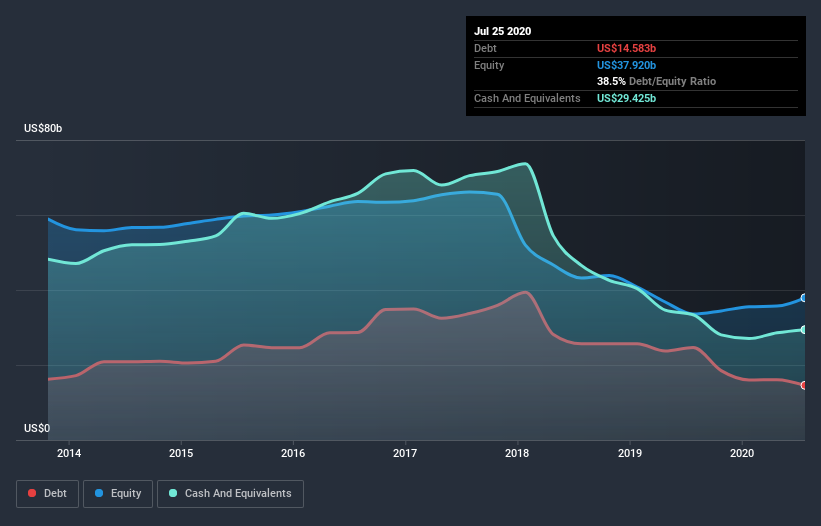Is Cisco Systems (NASDAQ:CSCO) A Risky Investment?

Legendary fund manager Li Lu (who Charlie Munger backed) once said, 'The biggest investment risk is not the volatility of prices, but whether you will suffer a permanent loss of capital.' So it might be obvious that you need to consider debt, when you think about how risky any given stock is, because too much debt can sink a company. We note that Cisco Systems, Inc. (NASDAQ:CSCO) does have debt on its balance sheet. But should shareholders be worried about its use of debt?
When Is Debt Dangerous?
Debt assists a business until the business has trouble paying it off, either with new capital or with free cash flow. Ultimately, if the company can't fulfill its legal obligations to repay debt, shareholders could walk away with nothing. However, a more frequent (but still costly) occurrence is where a company must issue shares at bargain-basement prices, permanently diluting shareholders, just to shore up its balance sheet. Of course, debt can be an important tool in businesses, particularly capital heavy businesses. The first step when considering a company's debt levels is to consider its cash and debt together.
Check out our latest analysis for Cisco Systems
What Is Cisco Systems's Net Debt?
You can click the graphic below for the historical numbers, but it shows that Cisco Systems had US$14.6b of debt in July 2020, down from US$24.7b, one year before. But it also has US$29.4b in cash to offset that, meaning it has US$14.8b net cash.
How Strong Is Cisco Systems's Balance Sheet?
We can see from the most recent balance sheet that Cisco Systems had liabilities of US$25.3b falling due within a year, and liabilities of US$31.6b due beyond that. On the other hand, it had cash of US$29.4b and US$10.5b worth of receivables due within a year. So its liabilities total US$17.0b more than the combination of its cash and short-term receivables.
Of course, Cisco Systems has a titanic market capitalization of US$170.0b, so these liabilities are probably manageable. However, we do think it is worth keeping an eye on its balance sheet strength, as it may change over time. Despite its noteworthy liabilities, Cisco Systems boasts net cash, so it's fair to say it does not have a heavy debt load!
While Cisco Systems doesn't seem to have gained much on the EBIT line, at least earnings remain stable for now. The balance sheet is clearly the area to focus on when you are analysing debt. But ultimately the future profitability of the business will decide if Cisco Systems can strengthen its balance sheet over time. So if you're focused on the future you can check out this free report showing analyst profit forecasts.
Finally, a business needs free cash flow to pay off debt; accounting profits just don't cut it. While Cisco Systems has net cash on its balance sheet, it's still worth taking a look at its ability to convert earnings before interest and tax (EBIT) to free cash flow, to help us understand how quickly it is building (or eroding) that cash balance. Over the last three years, Cisco Systems actually produced more free cash flow than EBIT. There's nothing better than incoming cash when it comes to staying in your lenders' good graces.
Summing up
We could understand if investors are concerned about Cisco Systems's liabilities, but we can be reassured by the fact it has has net cash of US$14.8b. And it impressed us with free cash flow of US$15b, being 103% of its EBIT. So is Cisco Systems's debt a risk? It doesn't seem so to us. Of course, we wouldn't say no to the extra confidence that we'd gain if we knew that Cisco Systems insiders have been buying shares: if you're on the same wavelength, you can find out if insiders are buying by clicking this link.
If, after all that, you're more interested in a fast growing company with a rock-solid balance sheet, then check out our list of net cash growth stocks without delay.
This article by Simply Wall St is general in nature. It does not constitute a recommendation to buy or sell any stock, and does not take account of your objectives, or your financial situation. We aim to bring you long-term focused analysis driven by fundamental data. Note that our analysis may not factor in the latest price-sensitive company announcements or qualitative material. Simply Wall St has no position in any stocks mentioned.
Have feedback on this article? Concerned about the content? Get in touch with us directly. Alternatively, email editorial-team@simplywallst.com.

